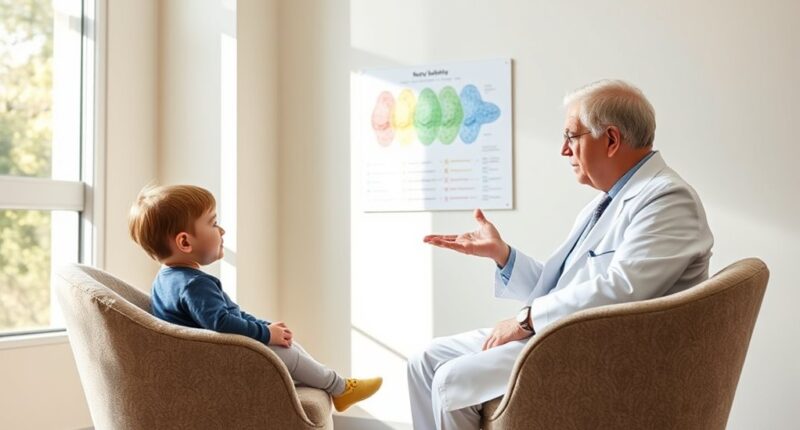A developmental pediatrician evaluates ADHD by thoroughly assessing your child’s behavior in different settings, gathering detailed information from parents, teachers, and the child. They use standardized rating scales and direct observations to create an accurate picture of your child’s strengths and challenges. This extensive approach helps differentiate ADHD from other issues and guides personalized treatment plans. If you want to understand how this process works and what to expect, there’s more to discover ahead.
Key Takeaways
- Developmental pediatricians conduct comprehensive assessments, gathering input from parents, teachers, and direct observation to evaluate ADHD behaviors.
- Accurate diagnosis involves differentiating ADHD from other developmental or behavioral issues through standardized tools and detailed history.
- Evaluation includes reviewing academic, medical, and developmental records to form a complete behavioral profile.
- Treatment planning may involve medication, behavioral therapy, and school strategies, with ongoing monitoring for effectiveness and safety.
- Caregiver involvement and consistent routines are essential for effective behavioral interventions and managing ADHD symptoms.

If your child shows signs of inattention, hyperactivity, or impulsivity, a developmental pediatrician can be a valuable resource in understanding and managing ADHD. These specialists are trained to evaluate developmental and behavioral issues, helping you navigate the complexities of your child’s behaviors. One of their primary tools is behavioral assessments, which involve gathering detailed information from multiple sources, including parents, teachers, and sometimes the child themselves. These assessments help identify specific patterns of behavior, pinpoint challenges, and differentiate ADHD from other possible conditions. They provide a thorough picture of your child’s functioning across different environments, enabling the pediatrician to determine whether ADHD is the underlying concern. Additionally, understanding the importance of comprehensive evaluation can lead to more accurate diagnoses and effective treatment planning.
Once a diagnosis is made, medication management often plays a significant role in treatment. A developmental pediatrician carefully considers whether medication is appropriate for your child, taking into account their unique needs and health history. They will discuss the potential benefits and side effects, making sure you’re fully informed before starting any medication. The pediatrician monitors your child’s response over time, adjusting dosages or switching medications if necessary to optimize effectiveness while minimizing adverse effects. This ongoing management is vital because every child reacts differently to medication, and what works well for one might not be suitable for another.
Medication management is tailored, monitored, and adjusted to meet each child’s unique needs for optimal results.
In addition to medication, behavioral interventions are often recommended, and your pediatrician can guide you through these options. They might suggest behavioral therapy, parent training, or school-based strategies to help your child develop skills to manage their symptoms effectively. Your involvement is essential; by working closely with the pediatrician, you can implement consistent routines and positive reinforcement techniques at home and school.
The evaluation process itself is detailed and tailored to your child’s specific situation. The developmental pediatrician may observe your child directly, review school reports, and use standardized rating scales to gather objective data. This thorough approach ensures an accurate diagnosis and a personalized plan. Remember, the goal is to support your child’s development and well-being, not just manage symptoms temporarily. With proper assessments and tailored treatment—including medication management when appropriate—you can help your child thrive despite the challenges of ADHD. The pediatrician’s expertise provides reassurance, guiding you through each step with clarity and confidence, ensuring your child receives the care they need to succeed.

Uflognirz ADHD Tools for Kids (Ages 5-12) – 50 Emotional Regulation Tool & Coping Skills for Kids Cards | Calm Down Corner Supplies, Focus Training, and Stress Relief | Self-Esteem & Mindfulness Item
🔹 50 ADHD Strategies – A Toolkit for Kids to Thrive. This ADHD tool for kids includes 50…
As an affiliate, we earn on qualifying purchases.
As an affiliate, we earn on qualifying purchases.
Frequently Asked Questions
How Early Can ADHD Be Reliably Diagnosed?
You can generally suspect ADHD as early as age 4, but a reliable diagnosis often happens after age 6. Early diagnosis depends on observing developmental milestones and consistent behavior patterns. Keep in mind that signs may overlap with other developmental issues, so a thorough evaluation by a specialist is essential. Monitoring your child’s progress and discussing concerns with a healthcare professional helps ensure accurate, timely diagnosis and support.
Are There Genetic Tests Available for ADHD?
Think of genetic tests for ADHD like a treasure map with clues, not a final answer. Currently, hereditary testing and genetic markers can hint at a genetic predisposition, but they aren’t definitive for diagnosis. You can’t get a straightforward genetic test for ADHD yet, but these tools can guide understanding of inherited risks. Always consult a healthcare professional for a thorough assessment, as genetics are just one piece of the puzzle.
What Are the Latest Treatment Options Beyond Medication?
Beyond medication, you can explore behavioral therapy, which helps you develop coping skills and manage symptoms effectively. Educational strategies are also essential; working with teachers to create structured routines and accommodations can make a big difference. Additionally, lifestyle changes like regular exercise, enough sleep, and nutrition support your overall well-being. Combining these approaches offers an all-encompassing plan to improve focus, organization, and behavior, empowering you to thrive.
How Does ADHD Affect a Child’s Social Development?
Imagine your child as a young hero steering the social landscape like Harry Potter at Hogwarts. ADHD can make social skills and peer interactions tricky, causing your child to miss subtle cues or struggle with impulse control. This might lead to difficulty forming friendships or feeling isolated. Your support helps them develop resilience, teaching them how to build meaningful relationships and improve social skills, just like a brave hero overcoming challenges.
Can Dietary Changes Improve ADHD Symptoms?
Dietary changes can help manage ADHD symptoms, but they aren’t a cure. Nutritional interventions, like eliminating artificial additives and sugar, may reduce hyperactivity. Some children benefit from dietary supplements such as omega-3 fatty acids, which support brain health. You should work with a healthcare professional to develop a tailored plan, as diet alone might not fully control symptoms but can be a helpful part of a holistic approach.

ADHD Rating Scale―5 for Children and Adolescents: Checklists, Norms, and Clinical Interpretation
Ships from Vermont
As an affiliate, we earn on qualifying purchases.
As an affiliate, we earn on qualifying purchases.
Conclusion
Understanding ADHD is like maneuvering a complex map—you need the right tools and guidance. As a developmental pediatrician, I’ve seen how thorough evaluations can illuminate the path forward, helping you support your child’s unique needs. Remember, every child is different, and patience is key. With the right approach, you can help your child thrive, just like a gardener tending to a delicate but resilient plant, nurturing growth amidst challenges.

SHAPES ETC. 4.25” x 5.5” Disciplinary – Notes to Parents, 50 Two-Part Carbon-Less Forms, Notes Home, Student Progress Reports, Teacher-Parent Communication, Learning Aid, Made in USA
MULTI-USE FORMS: Notes to Parents are perfect for documenting student progress, invitations for parent teacher and other meetings,…
As an affiliate, we earn on qualifying purchases.
As an affiliate, we earn on qualifying purchases.

Understanding ADHD Medication For Men, Women and Children: Complete Guide to Managing Your ADHD Medication, Acknowledging the Side Effects, Exploring Alternatives and Avoiding Addiction
As an affiliate, we earn on qualifying purchases.
As an affiliate, we earn on qualifying purchases.









